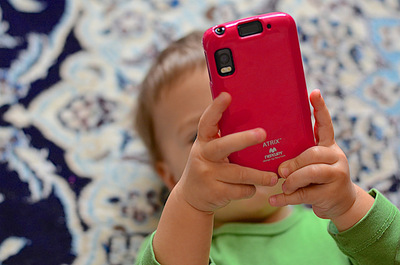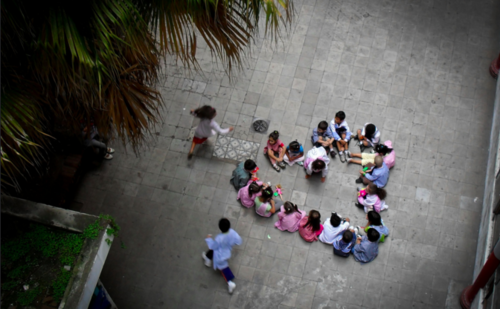As we approach the National Day of Unplugging on March 4, it's that time of year to talk about social media. Last year, at this time, I was working closely with The Meeting House, a pioneer organization in social and emotional learning based in New York City, preparing to speak at their symposium on social media and child development (Parents Magazine did a write-up here). How to regulate kids' social media usage is a perennially hot topic, with parents constantly looking for new guidelines in an ever-expanding digital frontier. I wrote two pieces on this issue that traveled far and wide (as far as Dubai!) and that were even translated into Portuguese. What I discovered is that we can always fall back on what we know -- namely that common-sense rules about good behavior can help guide our actions online; but also, we can use social media to cultivate meaningful digital interactions: Social media can indeed have soul.
The Meeting House symposium, which brought together four child development experts, added further context and research to this topic. Cyberbullying and technology addiction -- subjects of concern for all parents -- were also discussed, amidst other similarly daunting issues. To help simplify our conclusions from the symposium, I've created a list of the ABCs of social media usage that all parents should know.
- Relationships, Relationships, Relationships
Having a close and open relationship with your child is key. What is the quality of discussion like and how open are the lines of communication between you and your child?
As of 2007, Pew's benchmark report on teens and social media indicated that 64% of teens were sharing content online and 55% had a profile on at least one social network. Considering that the full impact of social media was not yet being felt seven years ago, the number of teens active on multiple social networks has only grown exponentially. Furthermore, Pew's more recent report, Teens and Technology 2013, notes that since 2006, the way teens use the internet has changed dramatically: Kids now use the internet via mobile, "always-on connections."
Since the majority of teens use devices that are always on hand, it's important to have regular discussions with your child about their social media usage. Establishing an open, honest relationship with your kids will make it easier to monitor what they're doing online.
Kids follow our example, and like any other kind of behavior, we need to show them how best to manage their social media habits. The key to setting an example? Be honest and aware of your own "screen time" habits. If you're like me and have moments of excessive social media use, be upfront with your kids about it -- modeling healthy habits and pointing out your own patterns will help build trust and keep your kids on a balanced track.
How can we work collaboratively with our kids when we don't understand the landscape? Download Snapchat. Download Instagram. Ask a teenager or someone you know with technology experience for advice on how to use these applications. The more you know about how to navigate the nuances of each social media platform, the better you'll be at recognizing appropriate and inappropriate behaviors.
My 15-year-old son doesn't like social media at all and doesn't use any of it (probably in reaction to my overusage). I am one of the rare parents who wishes he used a cell phone more regularly. It is important to remember that the way each child approaches social media will be specific to them, and it's crucial to tailor your monitoring based on their relationship to it.
Dr. Mega M. Subramaniam, associate director of Information Policy and Access Center at the University of Maryland, who spoke at the symposium, shared some research on the topic. According to Dr. Subramaniam, some studies have shown that young children tend to see social media monitoring as a power-play, and that strict regulations on social media usage often lead to them sharing more personal information online.
But, as Dr. Subramaniam points out, other "recent research has found that the use of direct parental controls (such as reading teen's social media postings and setting up teen's social media privacy settings) works best when combined with active mediation (greater parent engagement, such as talking with the teen about what he or she posts, reviewing information the teen posts with teen). Such blended approach from the parents empower teens/children to exercise good judgment on their privacy choices and online practices."
At the Flawless Foundation, we believe that every child should have the opportunity to develop healthy social and emotional skills on and offline. The movement to integrate Social and Emotional Learning (SEL) into our nation's schools is just beginning. Take a moment, do some research, and come up with a plan to introduce positive social and emotional development into your own home, the same way you would a new exercise or nutrition regimen.
Don't know where to start? Check out these resources below, and share them with the administration and parents' organizations at your child's school.
CASEL: Collaborative for Academic, Social, and Emotional Learning
"Our mission is to make evidence-based social and emotional learning an integral part of education from preschool through high school."
Twitter
"The Yale Center for Emotional Intelligence uses the power of emotions to create a more effective and compassionate society."
Twitter
Yale Profile
Profile on The Conversation
RULER at the Yale Center for Emotional Intelligence
"RULER is an acronym that stands for Recognizing, Understanding, Labeling, Expressing and Regulating emotions."
Here's to unplugging, taking social media breaks, and staying connected in Flawlessly healthy ways!


